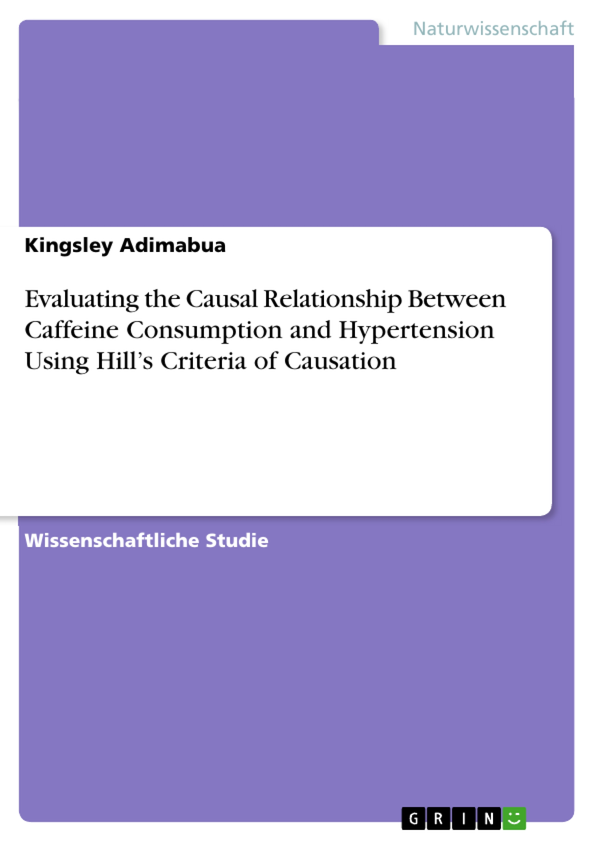Caffeine is one of the most widely consumed psychoactive substances globally, present in coffee, tea, soft drinks, and energy beverages. While its stimulating effects are well-documented, its potential role in elevating blood pressure and contributing to hypertension remains controversial. This paper evaluates whether a causal relationship exists between caffeine intake and high blood pressure by applying Bradford Hill’s criteria of causation. Drawing from epidemiological studies, experimental research, and physiological mechanisms, the analysis finds that while caffeine can cause short-term elevations in blood pressure, the long-term association with chronic hypertension is inconsistent. Some criteria such as temporality, biological plausibility, and experimental evidence are partially met, but others, including strength and consistency, show weaker support. The current evidence suggests that caffeine may have a modest and transient effect on blood pressure in certain populations but does not meet the full threshold for causality regarding chronic hypertension. Further longitudinal studies are needed to clarify the nature and magnitude of this relationship.
Inhaltsverzeichnis
- 1. Introduction
- 2. Methodology
- 3. Application of Hill's Criteria to Caffeine and Hypertension
- 3.1 Strength of Association
- 3.2 Consistency
- 3.3 Specificity
- 3.4 Temporality
- 3.5 Biological Gradient (Dose-Response Relationship)
- 3.6 Plausibility
- 3.7 Coherence
- 3.8 Experiment
Zielsetzung und Themenschwerpunkte
Diese Arbeit untersucht den kausalen Zusammenhang zwischen Koffeinkonsum und Bluthochdruck anhand der Bradford-Hill-Kriterien. Ziel ist es, die bestehenden wissenschaftlichen Erkenntnisse kritisch zu bewerten und die Wahrscheinlichkeit einer kausalen Beziehung zu bestimmen.
- Bewertung des Zusammenhangs zwischen Koffeinkonsum und Bluthochdruck
- Anwendung der Bradford-Hill-Kriterien zur Kausalitätsbeurteilung
- Analyse von epidemiologischen Studien, klinischen Studien und biologischen Mechanismen
- Unterscheidung zwischen kurzfristigen und langfristigen Auswirkungen
- Bewertung der Konsistenz und Stärke der Assoziation
Zusammenfassung der Kapitel
1. Introduction: Dieses Kapitel führt in das Thema Bluthochdruck als großes Gesundheitsproblem ein und stellt Koffein als weit verbreitete Substanz vor, deren Einfluss auf den Blutdruck kontrovers diskutiert wird. Es wird die Zielsetzung der Arbeit erläutert, nämlich die Anwendung der Bradford-Hill-Kriterien zur Beurteilung eines kausalen Zusammenhangs zwischen Koffeinkonsum und Bluthochdruck. Die Einleitung hebt die Unstimmigkeiten in bisherigen Forschungsergebnissen hervor und betont die Notwendigkeit einer umfassenden Analyse.
2. Methodology: Dieses Kapitel beschreibt die angewandte Methodik, die auf den neun Bradford-Hill-Kriterien der Kausalität basiert. Es werden die einzelnen Kriterien detailliert vorgestellt und die verschiedenen Arten von wissenschaftlichen Evidenzen benannt, die zur Bewertung herangezogen werden: epidemiologische Studien, klinische und Laborversuche, biologische und mechanistische Forschung sowie Meta-Analysen und systematische Reviews. Das Kapitel betont den Fokus auf sowohl kurzfristige als auch langfristige Effekte des Koffeins auf den Blutdruck.
3. Application of Hill's Criteria to Caffeine and Hypertension: Dieses Kapitel stellt die Anwendung der Hill-Kriterien auf den Zusammenhang zwischen Koffein und Bluthochdruck dar. Es analysiert die wissenschaftliche Evidenz für jedes Kriterium einzeln, wobei sowohl die Stärken als auch die Schwächen der Assoziation hervorgehoben werden. Die Zusammenfassung jedes Unterkapitels (3.1-3.8) würde die jeweilige Analyse der Evidenz für das spezifische Kriterium detailliert beschreiben, einschließlich der Darstellung widersprüchlicher Ergebnisse und der Schlussfolgerungen bezüglich des Beitrags des Kriteriums zur Beurteilung der Kausalität.
Schlüsselwörter
Koffein, Bluthochdruck, Hypertension, Bradford-Hill-Kriterien, Kausalität, epidemiologische Studien, klinische Studien, biologische Mechanismen, Dosis-Wirkungs-Beziehung, kurzfristig, langfristig.
Häufig gestellte Fragen
Worum geht es in diesem Dokument?
Dieses Dokument ist eine umfassende Sprachvorschau einer wissenschaftlichen Arbeit. Sie enthält das Inhaltsverzeichnis, die Zielsetzung und Themenschwerpunkte, Kapitelzusammenfassungen und Schlüsselwörter. Im Mittelpunkt steht die Untersuchung des Zusammenhangs zwischen Koffeinkonsum und Bluthochdruck.
Was ist das Ziel dieser Arbeit?
Ziel der Arbeit ist es, den kausalen Zusammenhang zwischen Koffeinkonsum und Bluthochdruck anhand der Bradford-Hill-Kriterien zu untersuchen. Die bestehenden wissenschaftlichen Erkenntnisse sollen kritisch bewertet und die Wahrscheinlichkeit einer kausalen Beziehung bestimmt werden.
Welche Themenschwerpunkte werden behandelt?
Die Themenschwerpunkte umfassen die Bewertung des Zusammenhangs zwischen Koffeinkonsum und Bluthochdruck, die Anwendung der Bradford-Hill-Kriterien zur Kausalitätsbeurteilung, die Analyse von epidemiologischen Studien, klinischen Studien und biologischen Mechanismen, die Unterscheidung zwischen kurzfristigen und langfristigen Auswirkungen sowie die Bewertung der Konsistenz und Stärke der Assoziation.
Welche Kapitel sind in der Arbeit enthalten?
Die Arbeit umfasst folgende Kapitel: 1. Introduction, 2. Methodology, 3. Application of Hill's Criteria to Caffeine and Hypertension. Kapitel 3 ist weiter unterteilt in: 3.1 Strength of Association, 3.2 Consistency, 3.3 Specificity, 3.4 Temporality, 3.5 Biological Gradient (Dose-Response Relationship), 3.6 Plausibility, 3.7 Coherence, 3.8 Experiment.
Was behandelt die Einleitung (Kapitel 1)?
Die Einleitung führt in das Thema Bluthochdruck ein, stellt Koffein als weit verbreitete Substanz vor und erläutert die Zielsetzung der Arbeit, nämlich die Anwendung der Bradford-Hill-Kriterien zur Beurteilung eines kausalen Zusammenhangs zwischen Koffeinkonsum und Bluthochdruck.
Welche Methodik wird in Kapitel 2 beschrieben?
Kapitel 2 beschreibt die angewandte Methodik, die auf den neun Bradford-Hill-Kriterien der Kausalität basiert. Es werden die einzelnen Kriterien detailliert vorgestellt und die verschiedenen Arten von wissenschaftlichen Evidenzen benannt, die zur Bewertung herangezogen werden.
Was wird in Kapitel 3 untersucht?
Kapitel 3 stellt die Anwendung der Hill-Kriterien auf den Zusammenhang zwischen Koffein und Bluthochdruck dar. Es analysiert die wissenschaftliche Evidenz für jedes Kriterium einzeln, wobei sowohl die Stärken als auch die Schwächen der Assoziation hervorgehoben werden.
Welche Schlüsselwörter werden in der Arbeit verwendet?
Die Schlüsselwörter umfassen: Koffein, Bluthochdruck, Hypertension, Bradford-Hill-Kriterien, Kausalität, epidemiologische Studien, klinische Studien, biologische Mechanismen, Dosis-Wirkungs-Beziehung, kurzfristig, langfristig.
- Quote paper
- Kingsley Adimabua (Author), 2025, Evaluating the Causal Relationship Between Caffeine Consumption and Hypertension Using Hill’s Criteria of Causation, Munich, GRIN Verlag, https://www.grin.com/document/1597573



